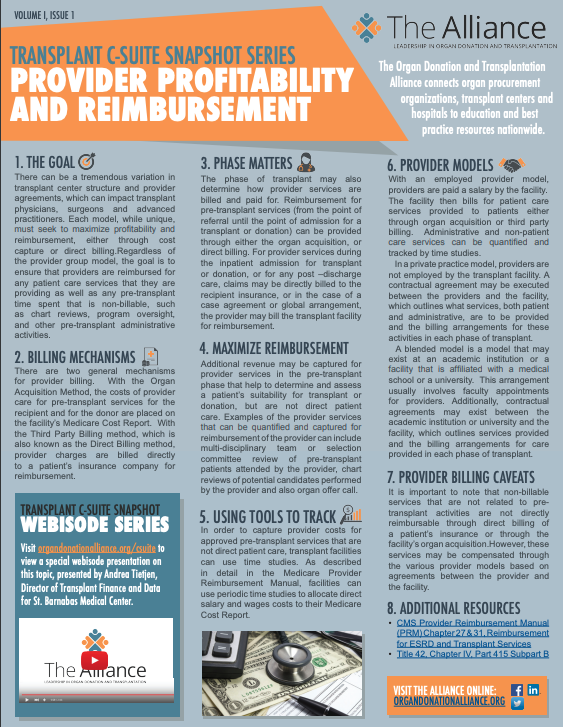THE GOAL
There can be a tremendous variation in transplant center structure and provider agreements, which can impact transplant physicians, surgeons and advanced practitioners. Each model, while unique, must seek to maximize profitability and reimbursement, either through cost capture or direct billing.Regardless of the provider group model, the goal is to ensure that providers are reimbursed for any patient care services that they are providing as well as any pre-transplant time spent that is non-billable, such as chart reviews, program oversight, and other pre-transplant administrative activities.
BILLING MECHANISMS
There are two general mechanisms for provider billing. With the Organ Acquisition Method, the costs of provider care for pre-transplant services for the recipient and for the donor are placed on the facility’s Medicare Cost Report. With the Third Party Billing method, which is also known as the Direct Billing method, provider charges are billed directly to a patient’s insurance company for reimbursement.
PHASE MATTERS
The phase of transplant may also determine how provider services are billed and paid for. Reimbursement for pre-transplant services (from the point of referral until the point of admission for a transplant or donation) can be provided through either the organ acquisition, or direct billing. For provider services during the inpatient admission for transplant or donation, or for any post –discharge care, claims may be directly billed to the recipient insurance, or in the case of a case agreement or global arrangement, the provider may bill the transplant facility for reimbursement.
MAXIMIZE REIMBURSEMENT
Additional revenue may be captured for provider services in the pre-transplant phase that help to determine and assess a patient’s suitability for transplant or donation, but are not direct patient care. Examples of the provider services that can be quantified and captured for reimbursement of the provider can include multi-disciplinary team or selection committee review of pre-transplant patients attended by the provider, chart reviews of potential candidates performed by the provider and also organ offer call.
USING TOOLS TO TRACK
In order to capture provider costs for approved pre-transplant services that are not direct patient care, transplant facilities can use time studies. As described in detail in the Medicare Provider Reimbursement Manual, facilities can use periodic time studies to allocate direct salary and wages costs to their Medicare Cost Report.
PROVIDER MODELS
With an employed provider model, providers are paid a salary by the facility. The facility then bills for patient care services provided to patients either through organ acquisition or third party billing. Administrative and non-patient care services can be quantified and tracked by time studies. In a private practice model, providers are not employed by the transplant facility. A contractual agreement may be executed between the providers and the facility, which outlines what services, both patient and administrative, are to be provided and the billing arrangements for these activities in each phase of transplant. A blended model is a model that may exist at an academic institution or a facility that is affiliated with a medical school or a university. This arrangement usually involves faculty appointments for providers. Additionally, contractual agreements may exist between the academic institution or university and the facility, which outlines services provided and the billing arrangements for care provided in each phase of transplant.
PROVIDER BILLING CAVEATS
It is important to note that non-billable services that are not related to pretransplant activities are not directly reimbursable through direct billing of a patient’s insurance or through the facility’s organ acquisition.However, these services may be compensated through the various provider models based on agreements between the provider and the facility.
We wish to thank Andrea Tietjen, Director of Transplant Finance and Data for St. Barnabas Medical Center for presenting. this special webisode.






